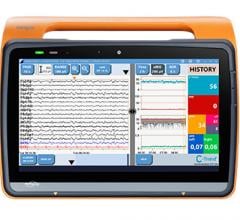September 24, 2014 — An initiative to improve the use of cardiac telemetry at Christiana Care Health System enhanced the value of care to patients and resulted in savings of $4.8 million, Christiana Care researchers reported in JAMA Internal Medicine, published online Sept. 22.
By integrating evidence-based guidelines on medication and telemetry use into Christiana Care’s health information technology (IT) systems and equipping nurses with supportive tools, more effective care was delivered through the use of cardiac telemetry, according to lead author Robert M. Dressler, M.D., MBA, vice chair of Christiana Care’s department of medicine.
“This study is about providing the right care to the right patient at the right time,” said Dressler, also the director of patient safety and quality for Christiana Care. “We focused on a national challenge that hospitals face and created an innovative system of care that enables us to be better stewards of our resources and provide care of greater value to our neighbors.”
Cardiac telemetry is frequently used in caring for hospital patients with serious problems. In cardiac telemetry, the heart rhythm of patients is tracked in real time through a medical device and the information is relayed into remote computers that are monitored by medical staff. The cardiac monitor is designed to trigger an alarm when there’s a concern, such as a prolonged stop in the heartbeat.
Cardiac monitoring is the standard of care in intensive care units (ICUs). However, the appropriate delivery of that care is more challenging in units outside of ICUs, where some patients may be in need of cardiac monitoring while others may not. Continuous telemetry monitoring outside of the ICU has been identified as one of “five things physicians and doctors should question” by the Society of Hospital Medicine’s Choosing Wisely campaign. The Choosing Wisely campaign, which is aimed at promoting safe and suitable use of care, selected telemetry monitoring since it has shown to be of limited benefit in the majority of patients who are low risk for heart problems.
Christiana Care integrated guidelines on the use of telemetry by both the American College of Cardiology (ACC) and the American Heart Association (AHA) into its health IT systems to help doctors distinguish those patients who need cardiac monitoring from those who do not. Christiana Care clinicians and pharmacists also partnered to identify which medications necessitated cardiac telemetry monitoring and which ones did not. In addition, nurses were given assessment tools to help them determine when cardiac telemetry monitoring could be discontinued safely.
The nine-month study is the first of this magnitude on non-ICU cardiac telemetry that demonstrates a 70 percent decrease in the cost for monitoring patients; a 47 percent decrease in the average duration of telemetry monitoring; and a 43 percent decrease in the number of telemetry orders. The initiative also led to a 70 percent reduction in telemetry use overall without any negative impact to patient safety.
“Historically, hospitals across the nation have struggled with how to most effectively use cardiac telemetry,” Dressler said. “We hope this study sheds light on solutions that can help hospitals provide care of the best value to this population of patients.”
The study authors include Dressler; Marylou M. Dryer, M.D., CMQ, medicine-pediatrics resident; Christian Coletti, M.D., FAAEM, FACP, medical director of Christiana Care’s Wilmington Hospital Emergency Department and Christiana Care Value Institute scholar; Donna Mahoney, MHCDS, CPHQ, director of Christiana Care Data Acquisition and Measurement; and Andrew Doorey, M.D., FACC, interventional cardiologist with Christiana Care Cardiology Consultants and Christiana Care Value Institute scholar.
For more information: www.christianacare.org/whoweare


 October 21, 2025
October 21, 2025 









